May 21, 2025 | 03:14 GMT +7
May 21, 2025 | 03:14 GMT +7
Hotline: 0913.378.918
May 21, 2025 | 03:14 GMT +7
Hotline: 0913.378.918
Editor's note:
Scientific research, a quest for new knowledge, entails considerable risks. In the realm of rice research in Vietnam, investment projects seldom permit the luxury of risks and errors. This poses a formidable challenge for numerous scientists currently researching at various institutes and schools nationwide.
Amid a profound transformation in our country's rice industry, addressing this challenge requires not only a national-level initiative but also a comprehensive approach involving public-private collaboration and international cooperation.
Through discussions with seasoned researchers specializing in Vietnamese rice varieties and consultations with managers, businesses, and international organizations, a team of reporters from the Vietnam Agriculture Newspaper presents diverse perspectives on the potential establishment of the National Rice Research Foundation. This initiative aims to foster the development of a sustainable, high-quality, and nutritious Vietnamese rice brand.
At almost 80, Labor Hero Dr. Nguyen Thi Tram remains fervently dedicated to her profession, conducting field research in plains and mountainous areas to explore new rice varieties.
"This is remarkable! I have written extensively on this matter and hope to garner widespread attention."
The female scientist's voice resonated clearly. When questioned about her research and rice breeding, the conversation gained momentum. In just a few minutes, she delivered an impromptu 'lecture' on the definition of hybrid vigor, male sterility, and the intricate process of rice starch digestion. Even at nearly 80, she persists in seed research, dissemination of technology, and contributing intellectually to national food security.
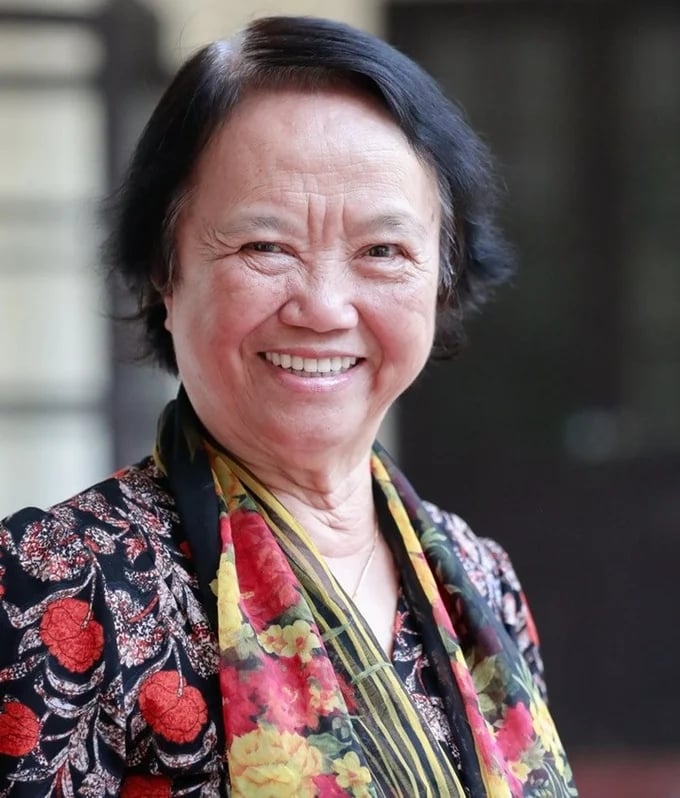
Labor Hero, Dr. Nguyen Thi Tram, renowned as the leading contributor to hybrid rice varieties in Vietnam, is pictured above. Photo: Viet Cuong.
Distinguished as a trailblazing female scientist in rice research, Dr. Nguyen Thi Tram boasts over half a century of unwavering commitment to her profession. With a genuine passion for research and an early embrace of advancements in science and technology in breeding, she has earned the distinction of being the foremost figure in transferring the copyright of numerous hybrid rice varieties in Vietnam.
Having graduated from university in 1968, Dr. Tram embarked on her professional journey at the Food Crops Research Institute. Under the guidance of agronomy professor Luong Dinh Cua, she not only acquired knowledge but also imbibed a deep-seated dedication to scientific labor. Motivated by her esteemed and talented mentor, she immersed herself in research, yielding many rice varieties, including NN-9, NN-10, NN-23, NN-75-6, and many more.
In 1985, after completing her program at the Soviet Rice Research Institute, she transitioned to a teaching role at the University of Agriculture I (now the Vietnam Academy of Agriculture).
The year 1993 marked a significant turning point for Vietnamese rice science. The Ministry of Agriculture and Food Industry (predecessor of the Ministry of Agriculture and Rural Development) dispatched the first five individuals to China for studies guided by Professor Yuan Longping, revered as the "father of hybrid rice." This momentous event is considered a pivotal juncture not only in the scientific career of Dr. Nguyen Thi Tram but also in the broader landscape of the Vietnamese rice industry.
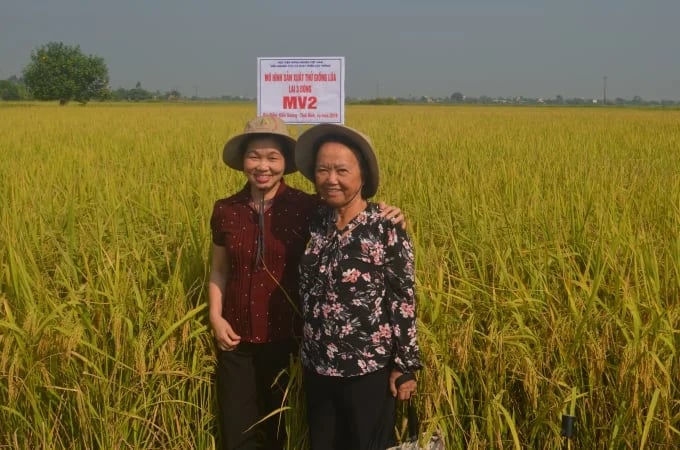
Labor Hero, Dr. Nguyen Thi Tram (right) visits a 3-line hybrid rice variety MV2 trial production model. Photo: Nguyen Muoi.
Reflecting on memories from four decades ago, the esteemed scientist remarked, "Prof. Yuan Longping succinctly encapsulated success in eight words: Knowledge, Dedication, Inspiration, Opportunity. According to him, opportunities arise only when there is preparation. The prospects for Vietnamese hybrid rice hinge on a knowledgeable, dedicated, and passionate scientific research team that is well-prepared – equipped with abundant material resources and supported by appropriate agricultural science and technology policies."
Dr. Nguyen Thi Tram commented on global trends and noted that specialized rice research has become particularly pertinent. In 2020, she meticulously compiled a series of comprehensive research documents on starch composition worldwide, particularly on resistant plant starch in the heart. This type of starch, resistant to digestive enzymes, is deemed highly beneficial for users' health. It traverses the upper digestive tract directly to the colon, undergoing fermentation by intestinal bacteria, which is conducive to reducing colon cancer precursors, regulating the macronutrient metabolic system, and enhancing overall physical and mental health.
The esteemed scientist candidly said, "Now that I am in my twilight years, I primarily support young researchers. However, there are still numerous unexplored ideas awaiting realization. Many promising research topics with significant scientific value exist, but unfortunately, there is a shortage of funding for their expansion. In the past, traditional research was conducted; today, we possess ample resources to advance the field of rice science."
Vietnam embraced Chinese hybrid rice technology early, with Minister of Agriculture Nguyen Cong Tan being the first to introduce it directly. Vietnam has mastered both 3-line and 2-line hybrid rice technologies, resulting in the development of a diverse array of hybrid rice varieties for large-scale production. Notable contributors to this endeavor include Associate Professor Dr. AHLĐ Nguyen Thi Tram, Associate Professor Dr. Nguyen Tri Hoan, Associate Professor Dr. Nguyen Van Hoan, Associate Professor Dr. Tran Van Quang, among others.
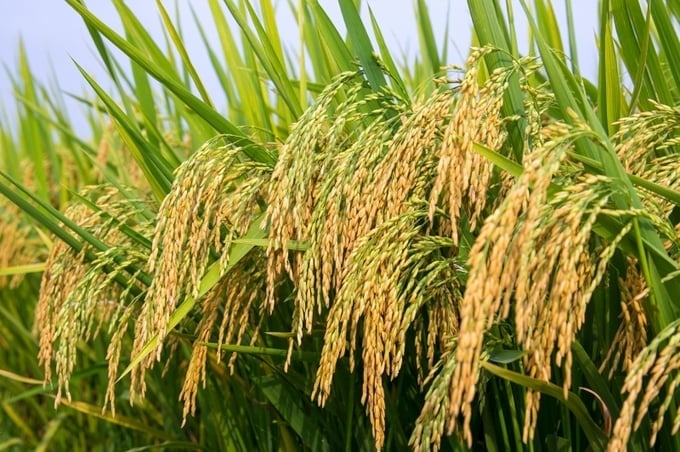
Over nearly three decades, Vietnam has made substantial progress in breeding and research, addressing the challenges of climate change and market demands. In 1994, the Ministry of Agriculture and Rural Development established the Hybrid Rice Research and Development Center to oversee the seed research and production network. Hybrid rice varieties, popularized in the 1990s, revolutionized rice productivity in the North.
The role of hybrid rice research must continue to be prioritized and promoted. In the immediate and foreseeable future, Vietnam will require a repertoire of high-quality hybrid rice varieties rich in nutrients and adaptable to climate change to ensure food security. Given that rice sustains over half of the world's population, projections indicate a 60% increase in global rice production by 2030 compared to the 1995 output.
In 2020, China achieved a yield of 18 tons/ha with super hybrid rice, approaching the rice potential yield of 23.2 tons/ha as per the IRRI Annual Report 1996. In 2021, hybrid rice covered an area of 16 million hectares, constituting 57% of the total rice area and contributing to approximately 65% of China's total rice output, according to The Rice Journal.
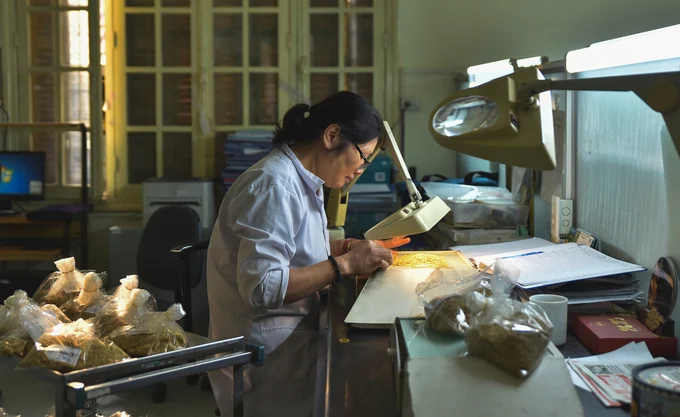
Scientific research is a long journey, requiring perseverance and passion.
Embarking on scientific research is an enduring journey, demanding unwavering perseverance and unbridled passion. Nevertheless, Vietnamese rice science is grappling with investment sources and policy mechanism challenges. An industry veteran, involved since the inception of hybrid rice in Vietnam, candidly shared, "Every step in research must be executed with extreme caution. Selecting hybrid rice varieties is a complex and protracted process. One must embrace risks to yield results, yet project-based research is conducted without such flexibility. Consequently, scientists are deprived of the opportunity to experiment and learn from potential mistakes. If the endeavor proves unsuccessful, the investment becomes irrecoverable."
"Scientific research demands meticulousness to generate accurate results," emphasized Dr. Tran Ngoc Thach, Director, and Dr. Nguyen Thuy Kieu Tien, Deputy Director, of the Cuu Long Rice Research Institute.
At the International Rice Congress held in October 2023 in the Philippines, a groundbreaking scientific achievement was unveiled—a rice variety boasting an exceptionally low glycemic index (GI) of 44. According to the International Rice Research Institute (IRRI), GI levels below 45 are classified as extremely low, 46-55 as low, 56-69 as moderate, and above 70 as high.
During the opening ceremony, the first batch of rice samples with an extremely low glycemic index was presented to Philippine President Ferdinand Marcos Jr., marking a concerted effort to safeguard diabetics' health and combat this disease globally.
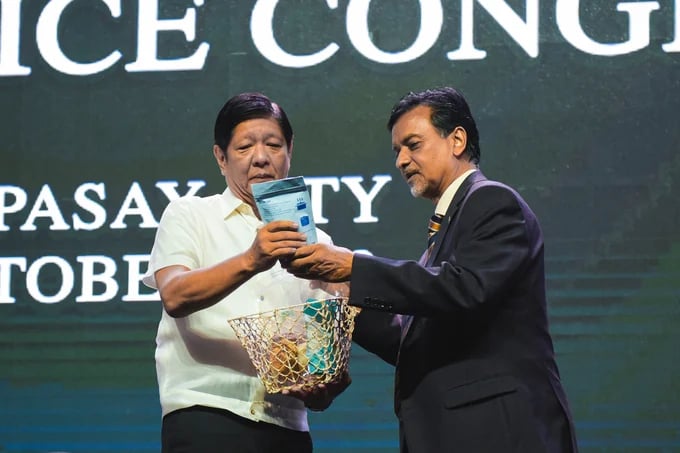
The first batch of rice samples with an extremely low glycemic index was presented to the President of the Philippines at the 2023 International Rice Congress opening ceremony.
In an interview with the Vietnam Agriculture Newspaper, the Cuu Long Rice Research Institute leaders revealed that Vietnamese scientists have identified a rice variety with a glycemic index of 46 (low level). This variety, characterized by soft grains and a low amino acid index, facilitates easy digestion and benefits individuals with diabetes, prediabetes, or obesity. Additionally, the Institute has developed a comprehensive range of micronutrient-rich rice varieties, catering to diverse consumer needs.
Regrettably, due to insufficient funding for clinical trials — essential for hiring volunteers to undergo blood samples before and after consuming rice, as well as investing in equipment and analysis — the Institute has been unable to establish criteria and systematically evaluate these nutritious rice varieties. Consequently, this collection of healthful rice varieties remains confined to the laboratory, with their nutritional values yet to be effectively developed.
Translated by Quynh Chi

(VAN) Japan's grant aid project contributes to capacity building, promoting organic agricultural production, and fostering sustainable community development in Dong Thap province.

(VAN) For years, the CRISPR-Cas9 genome technology has been reshaping genetic engineering, a precision tool to transform everything from agriculture to medicine.

(VAN) Vietnam aims to become a 'leader' in the region in the capacity and managing effectively soil health and crop nutrition.
![Reducing emissions from rice fields: [Part 1] Farming clean rice together](https://t.ex-cdn.com/nongnghiepmoitruong.vn/608w/files/news/2025/05/05/z6509661417740_a647202949c539012a959e841c03e1d3-nongnghiep-143611.jpg)
(VAN) Growing clean rice helps reduce environmental pollution while increasing income, allowing farmers to feel secure in production and remain committed to their fields for the long term.
/2025/05/19/5136-1-144800_230.jpg)
(VAN) The Nghe An Provincial People's Committee has just approved the list of beneficiaries eligible for revenue from the Emission Reductions Payment Agreement (ERPA) in the North Central region for the year 2025.

(VAN) 14 out of 35 domesticated elephants in Dak Lak province have had their living conditions improved, with 11 of them currently participating in the non-riding elephant tourism model.

(VAN) Muong Nhe Nature Reserve hopes that being upgraded to a national park will lay the foundation for forest protection efforts to be carried out in a systematic, modern, and sustainable manner.